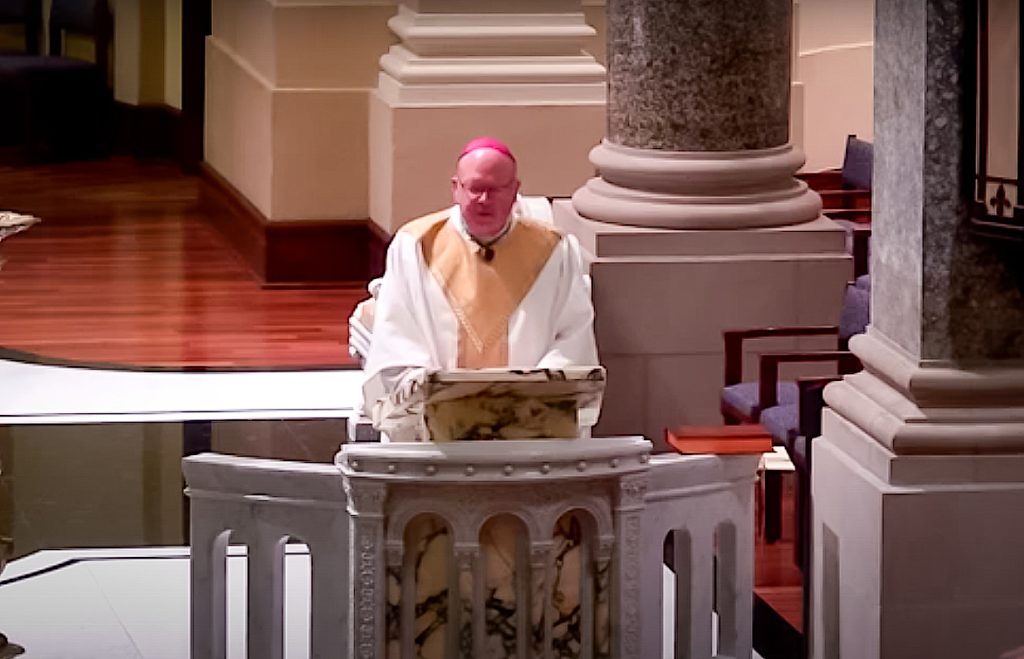Bishop asks faithful to prune everything that takes life, to protect the vulnerable

Bishop Carl A. Kemme said he recalled memories of his grandfather while preparing for his homily for a Mass of Healing and Repentance last Sunday at the Cathedral of the Immaculate Conception in Wichita.
“Whenever I hear the words of today’s Gospel, I almost always think of my grandpa, who took great pride in a small vineyard on his farm, which he loved to tend so that he would provide lush and very sweet tasting grapes,” he said.
Vines and vineyards are deeply biblical, the bishop added.
Vineyards are symbolic
“There are many references to them throughout the entire bible. Israel was likened to a vine coming out of Egypt that God planted. The prophet Hosea made this statement centuries before Christ: ‘Israel was a luxuriant vine that yields its fruit.’ The image was not always spoken of so positively. In the more faithless times of Israel’s history, she was likened to an overrun vineyard, full of weeds and refuse such that it could produce little to no fruit.”
Jesus calls himself the true vine, the bishop said. “The true vine is full of life that extends to the branches by his life-giving grace so that we can produce an abundant harvest. But in order for this to happen, the branches need pruning so as to produce greater quantities and better grapes. There needs to be a cutting back of the branches so that those who can produce greater fruit will do so, but those who are lifeless and withered must be bundled up and burned.”
We must prune ourselves
Pruning in our spiritual lives, Bishop Kemme said, is taking stock of our lives and ridding ourselves of that which is useless, unproductive, and withered.
“There are sinful behaviors, worn-out ways of thinking and behaving that weigh us down and prevent us from being more spiritually productive. There are in each of us dead branches that need to be collected and burned by mortification, penance, and repentance. Suffering, though not sought after, also helps us redirect ourselves as branches connected to the vine; it helps to burn away our idols, our propensity to focus on the things of earth and this life, instead of focusing on the things of heaven.”
Saintly lives of penance
The saints embraced lives of penance, mortification, and suffering – even voluntary suffering – so that their spiritual lives could produce an abundant harvest, he said. “This is what must happen in each of us.”
The bishop explained that he was offering the Mass of healing for those who have been abused, either sexually, physically, or emotionally, especially by a priest, a religious, or a lay person representing the church.
“In the past 20-plus years, the church has had to face the fact that some bishops, some priests, some religious, and some members of the laity harmed children, young persons, and vulnerable adults, leaving them bewildered, devastated, and demoralized,” Bishop Kemme said.
“The damage in the wake of such abuse is beyond comprehension, but the fact that this happened when it should never have happened by people who were given so much trust and authority in people’s lives is something we cannot hide from or dismiss. Rather, it should motivate each of us – it certainly does me – to do everything in our power to prevent it from happening again.”
Keeping children safe
He said the diocesan safe environment protocols and policies, though not perfect, are designed to give the faithful the assurance they need to know that they and their children and loved ones are safe in our care.
“We must also do everything we can to say something or do something when we see something that is wrong or even gives the semblance of being inappropriate and harmful. All of us are duty-bound to be guardians of the little ones, the powerless, and the vulnerable,” the bishop said.
The pruning mentioned in the Gospel is relevant, he said, because our repentance of past crimes and sins and our commitment to a safe environment is a pruning of sorts to clear that which takes life instead of giving it. “Abuse in every form is a dead branch and we can have none of it in our church.”
Jesus is the true vine
Jesus calls himself the true vine and can be trusted because he is love, Bishop Kemme said.
“If we can trust him, we should be able to trust those who represent him in the church. But that trust must be verified and that is a completely good thing.”
The bishop closed his homily by asking for prayer for all victims that they will find peace in their journey to healing and justice.
“May the church which is the vineyard of the Lord be continually pruned of violence and abuse, so that what remains is nothing but pure, holy, and full of life!” he said.
